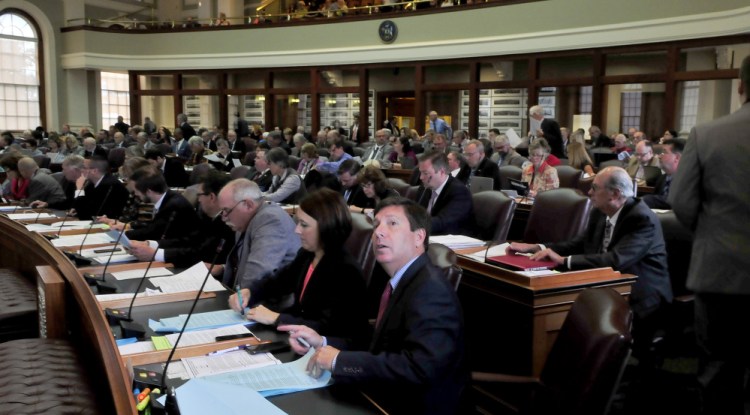The calendar might call this a new year, but the Maine Legislature and Gov. LePage look to be headed for a continuation of the 2017 stalemate in Augusta.
The first session of the 128th Legislature ended with a government shutdown, engineered by the governor and his allies in the Maine House, and it gave the unfortunate template for what we can expect to see more of in 2018.
Republicans have a slim one-vote majority in the Maine Senate, and Democrats are clinging to a 70-74 advantage in the House, with a record number of representatives who aren’t enrolled in either major party.
You would think that this kind of division would require bipartisan cooperation, and lawmakers have tried. But LePage has proven that a highly motivated, partisan minority can stop a bipartisan majority cold.
House Speaker Sara Gideon and Senate President Michael Thibodeau negotiated a budget compromise, which LePage torpedoed at the last minute, and enough House Republicans stuck with him to deny the bill the two-thirds support it needed to pass. As a result, the minority got to dictate terms to the majority.
We saw an echo of that dynamic with the marijuana regulation bill that came before a special session in December. The voters passed a referendum to legalize pot, and a bipartisan group of lawmakers developed a set of rules to govern who can sell it, who can buy it and how to keep it away from children. The bill passed both houses, but LePage vetoed it, and again held on to enough House Republicans to keep it from becoming law.
Lawmakers are optimistic that they can tweak the bill to get it passed this month, but some of LePage’s objections, like marijuana’s legal status under federal law, are beyond the Legislature’s ability to fix.
We are likely to see more of this kind of brinksmanship this year. The hot button will be Medicaid expansion, which was approved by the voters in November.
LePage and House Republican Leader Ken Fredette say they will not raise taxes or spend reserve funds to draw down a 9-to-1 federal match, which would provide a much-needed lifeline for Maine’s rural hospitals, as well as offering health care coverage to low-wage workers and their families.
The budget and the marijuana bill provide the likely script for what will happen next. LePage will absent himself from the negotiations, find something wrong with whatever bipartisan compromise the others reach and use his cadre of supporters in the House as a brake to stop the process from moving forward.
In that case, the issue will likely wind up in court, eating up most of 2018 without a resolution.
Big changes will be coming, but for that we’ll have to wait until 2019. Gov. LePage, who is prevented from running for re-election by term limits, begins counting down the days of his last year in office this month. And there are an incredible number of candidates (26 so far) who want to take his place.
Many members of the Legislature are also in their last year. Fourteen House Republicans came to Augusta in the same 2010 tea party wave that carried LePage, and they include key LePage allies like Fredette, Assistant Republican Leader Ellie Espling and Reps. Deborah Sanderson and Heather Sirocki.
A year from now, we will be looking at a new cast of characters, but they will likely be facing the same problems, unless the current group in Augusta figures out how to break the stalemate.
Send questions/comments to the editors.



Success. Please wait for the page to reload. If the page does not reload within 5 seconds, please refresh the page.
Enter your email and password to access comments.
Hi, to comment on stories you must . This profile is in addition to your subscription and website login.
Already have a commenting profile? .
Invalid username/password.
Please check your email to confirm and complete your registration.
Only subscribers are eligible to post comments. Please subscribe or login first for digital access. Here’s why.
Use the form below to reset your password. When you've submitted your account email, we will send an email with a reset code.